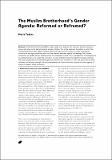| dc.contributor.author | Tadros, Mariz | en |
| dc.date.accessioned | 2016-01-07T16:31:13Z | |
| dc.date.available | 2016-01-07T16:31:13Z | |
| dc.date.issued | 1/1/2011 | en |
| dc.identifier.citation | Tadros, M. (2011) The Muslim Brotherhood's Gender Agenda: Reformed or Reframed?. IDS Bulletin 42(1): 88-98 | en |
| dc.identifier.issn | 1759-5436 | en |
| dc.identifier.uri | https://opendocs.ids.ac.uk/opendocs/handle/20.500.12413/7568 | |
| dc.description.abstract | The Muslim Brotherhood (MB) has been hailed as an example of a reformist Islamist movement whose role is key to the democratisation process in Egypt. This article examines the extent to which first, the Muslim Brotherhood's agenda has been reformed, and second, the extent to which it recognises women's full and equal citizenship and third, the interface between agency and ideology. The multiple standpoints on gender matters existing within the movement is more than a manifestation of heterogeneity; its political function is to enable the movement to adopt different faces (framings) for multiple audiences. The article argues that the fundamental gendered construction of division of roles and power has not been reformed but reframed through the instrumentalisation of various discourses, despite the active agency of women in support of the movement. | en |
| dc.format.extent | 11 | en |
| dc.publisher | Blackwell Publishing Ltd | en |
| dc.relation.ispartofseries | IDS Bulletin Vol. 42 Nos. 1 | en |
| dc.rights.uri | http://www.ids.ac.uk/files/dmfile/IDSOpenDocsStandardTermsOfUse.pdf | en |
| dc.title | The Muslim Brotherhood's Gender Agenda: Reformed or Reframed? | en |
| dc.type | Article | en |
| dc.rights.holder | © 2011 The Author. IDS Bulletin © 2011 Institute of Development Studies | en |
| dc.identifier.doi | 10.1111/j.1759-5436.2011.00204.x | en |

